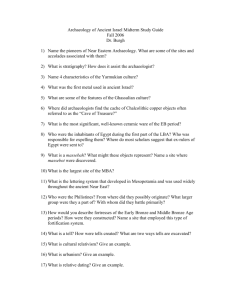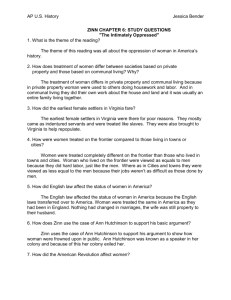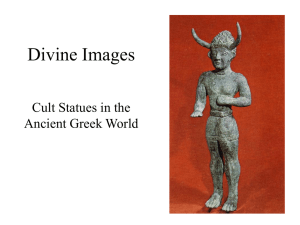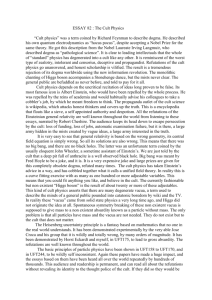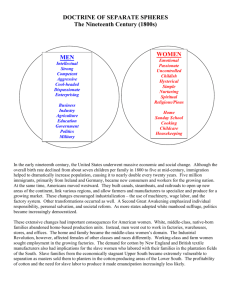Men, Sex, and Scandal: Anxiety over Male Participation in the
advertisement
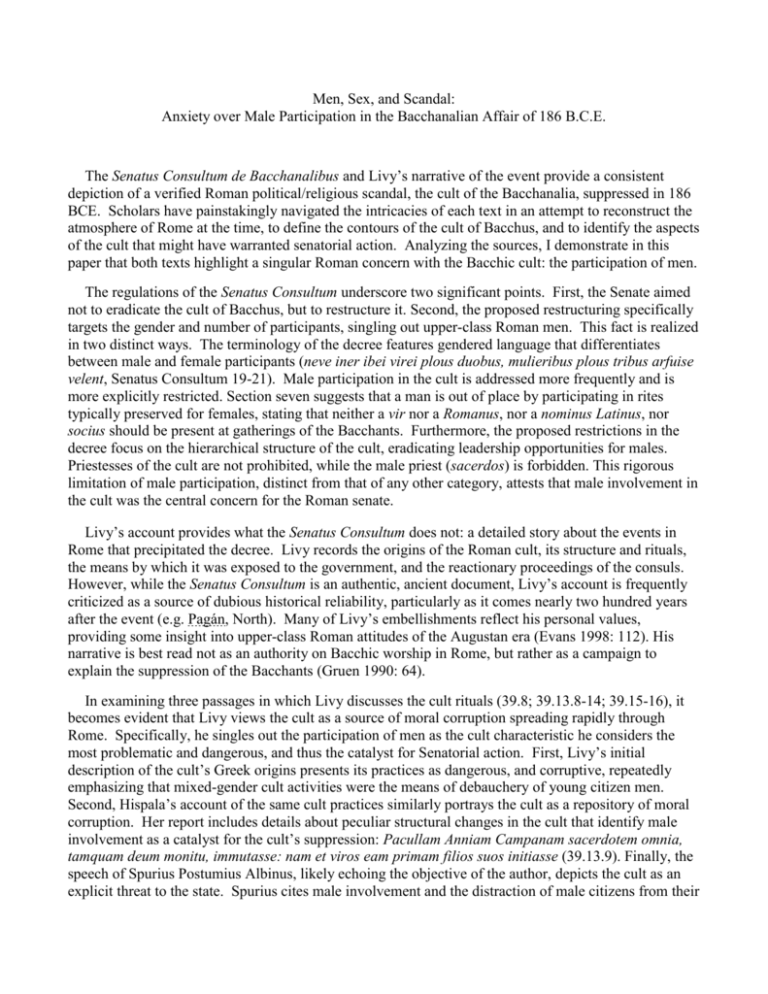
Men, Sex, and Scandal: Anxiety over Male Participation in the Bacchanalian Affair of 186 B.C.E. The Senatus Consultum de Bacchanalibus and Livy’s narrative of the event provide a consistent depiction of a verified Roman political/religious scandal, the cult of the Bacchanalia, suppressed in 186 BCE. Scholars have painstakingly navigated the intricacies of each text in an attempt to reconstruct the atmosphere of Rome at the time, to define the contours of the cult of Bacchus, and to identify the aspects of the cult that might have warranted senatorial action. Analyzing the sources, I demonstrate in this paper that both texts highlight a singular Roman concern with the Bacchic cult: the participation of men. The regulations of the Senatus Consultum underscore two significant points. First, the Senate aimed not to eradicate the cult of Bacchus, but to restructure it. Second, the proposed restructuring specifically targets the gender and number of participants, singling out upper-class Roman men. This fact is realized in two distinct ways. The terminology of the decree features gendered language that differentiates between male and female participants (neve iner ibei virei plous duobus, mulieribus plous tribus arfuise velent, Senatus Consultum 19-21). Male participation in the cult is addressed more frequently and is more explicitly restricted. Section seven suggests that a man is out of place by participating in rites typically preserved for females, stating that neither a vir nor a Romanus, nor a nominus Latinus, nor socius should be present at gatherings of the Bacchants. Furthermore, the proposed restrictions in the decree focus on the hierarchical structure of the cult, eradicating leadership opportunities for males. Priestesses of the cult are not prohibited, while the male priest (sacerdos) is forbidden. This rigorous limitation of male participation, distinct from that of any other category, attests that male involvement in the cult was the central concern for the Roman senate. Livy’s account provides what the Senatus Consultum does not: a detailed story about the events in Rome that precipitated the decree. Livy records the origins of the Roman cult, its structure and rituals, the means by which it was exposed to the government, and the reactionary proceedings of the consuls. However, while the Senatus Consultum is an authentic, ancient document, Livy’s account is frequently criticized as a source of dubious historical reliability, particularly as it comes nearly two hundred years after the event (e.g. Pagán, North). Many of Livy’s embellishments reflect his personal values, providing some insight into upper-class Roman attitudes of the Augustan era (Evans 1998: 112). His narrative is best read not as an authority on Bacchic worship in Rome, but rather as a campaign to explain the suppression of the Bacchants (Gruen 1990: 64). In examining three passages in which Livy discusses the cult rituals (39.8; 39.13.8-14; 39.15-16), it becomes evident that Livy views the cult as a source of moral corruption spreading rapidly through Rome. Specifically, he singles out the participation of men as the cult characteristic he considers the most problematic and dangerous, and thus the catalyst for Senatorial action. First, Livy’s initial description of the cult’s Greek origins presents its practices as dangerous, and corruptive, repeatedly emphasizing that mixed-gender cult activities were the means of debauchery of young citizen men. Second, Hispala’s account of the same cult practices similarly portrays the cult as a repository of moral corruption. Her report includes details about peculiar structural changes in the cult that identify male involvement as a catalyst for the cult’s suppression: Pacullam Anniam Campanam sacerdotem omnia, tamquam deum monitu, immutasse: nam et viros eam primam filios suos initiasse (39.13.9). Finally, the speech of Spurius Postumius Albinus, likely echoing the objective of the author, depicts the cult as an explicit threat to the state. Spurius cites male involvement and the distraction of male citizens from their proper duties in society as the most damaging aspects of the Bacchic cult: hoc sacramento initiatos iuvenes milites faciendos censetis, Quirites? (39.15.13). Examined together, the two sources operate in a complementary fashion to demonstrate the Senate’s express concern with male participation in the cult. The Senatus Consultum imposes restrictions that particularly target men; Livy draws upon structural changes in the Bacchanalia, cult practices, and the consular prosecution to call attention to the role of men in the cult. In each source, the singularity of male involvement is firmly established as a critical origin of the controversy. For both the senate in 186 and for Livy, over 160 years later, the moral destruction of young men poses a threat to Rome greater than anything else in this exotic scandal. Works Cited Evans, Arthur. The God of Ecstasy: Sex Roles and the Madness of Dionysus. New York: St. Martin’s Press, 1998. Gruen, Erich S. Studies in Greek Culture and Roman Policy. Leiden: E.J. Brill, 1990. North, John. Roman Religion. Cambridge: Cambridge University Press, 2000. Pagán, Victoria Emma. Conspiracy Narratives in Roman History. Austin: University of Texas, Press 2004.
